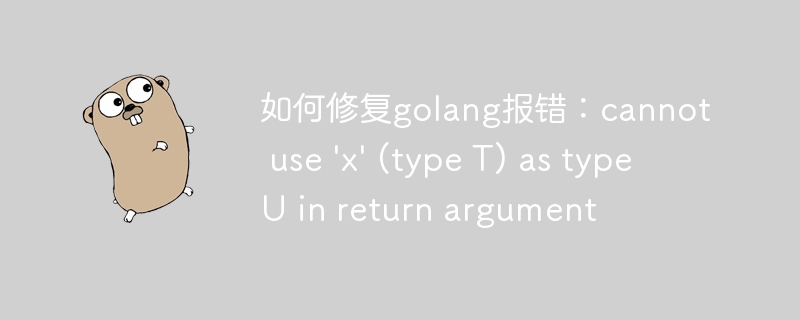

How to fix golang error: cannot use 'x' (type T) as type U in return argument
In golang development, various errors are often encountered information. One of the common errors is: cannot use 'x' (type T) as type U in return argument. This error usually occurs when the type of the function return value does not match. This article explains how to fix this error and provides some code examples.
First, let us take a look at the background and reasons for this error. In golang, the type of return value needs to be specified when a function is declared. This error occurs when the function's return value type does not match the actual return value type. This problem usually occurs in the following situations:
Below we will explain these two situations respectively, and give corresponding repair methods and code examples.
In this case, we need to check the return value type declared by the function and the actual return type of the function Are the types consistent? If it is inconsistent, you need to modify the return value type to make it consistent with the type actually returned by the function.
For example, in the following sample code, the function add returns the sum of two integers, but the return value type declared by the function is a string. This will cause the compiler to report an error: cannot use 'add(1, 2)' (type int) as type string in return argument.
package main
import "fmt"
func add(x, y int) string {
return x + y // 返回的类型应该是int,而不是string
}
func main() {
result := add(1, 2)
fmt.Println(result)
}To fix this problem, we only need to change the return value type of the function declaration to int.
package main
import "fmt"
func add(x, y int) int {
return x + y
}
func main() {
result := add(1, 2)
fmt.Println(result)
}In this case, we need to ensure that the other functions or codes Able to correctly handle all values returned by functions. Otherwise, the compiler will report an error: cannot use 'x' (type T) as type U in return argument.
For example, in the following sample code, the function div returns the quotient and remainder of two integers. But in the main function, only the quotient part of the return value is processed, and the remainder part of the return value is ignored. This will cause the compiler to report an error: cannot use 'div(10, 3)' (type int) as type string in return argument.
package main
import "fmt"
func div(x, y int) (int, int) {
return x / y, x % y
}
func main() {
result := div(10, 3)
fmt.Println(result)
}To fix this problem, we need to use placeholders in the main function or assign the return value to multiple variables to receive all values returned by the function.
One solution is to use the placeholder "_" to ignore the return value that does not need to be processed:
package main
import "fmt"
func div(x, y int) (int, int) {
return x / y, x % y
}
func main() {
quotient, _ := div(10, 3)
fmt.Println(quotient)
}Another solution is to assign the return value to multiple variables to receive All values returned by the function:
package main
import "fmt"
func div(x, y int) (int, int) {
return x / y, x % y
}
func main() {
quotient, remainder := div(10, 3)
fmt.Println(quotient, remainder)
}With the above two fixes, we can solve the problem of function return value type mismatch. This not only avoids compilation errors, but also ensures the correctness and readability of the code.
To sum up, when encountering golang's error "cannot use 'x' (type T) as type U in return argument", we need to check whether the return value type declared by the function is the type actually returned by the function. Be consistent and ensure that other functions or code can correctly handle all values returned by the function. By making the appropriate fixes, we can get the code to compile, run, and get the correct results.
The above is the detailed content of How to fix golang error: cannot use 'x' (type T) as type U in return argument. For more information, please follow other related articles on the PHP Chinese website!




